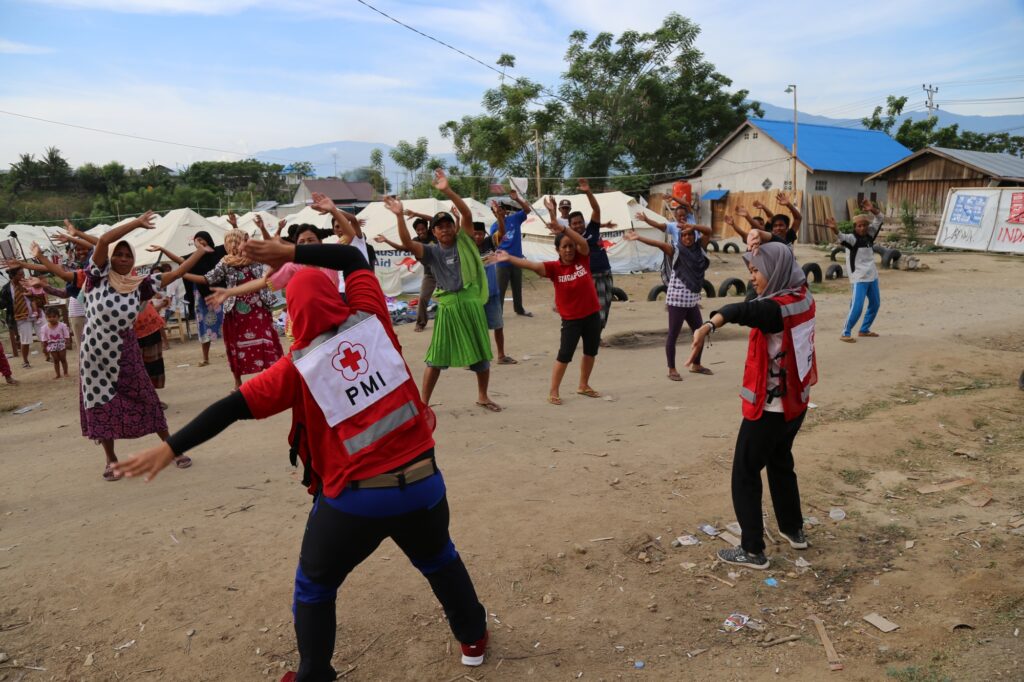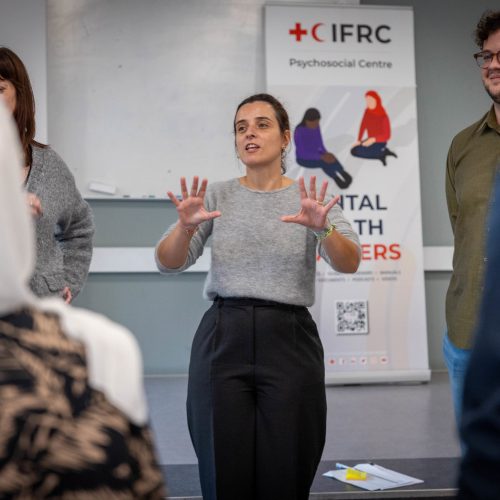

Mental Health and Psychosocial Support Emergency Response Unit Training
- Date: 20 November – 25 November
- Time: 09.00 – 17.00
- Location: Hong Kong Red Cross Branch Headquarters, Hong Kong SAR
Emergencies present a multitude of challenges that affect individuals, families, communities, and society as a whole. Such situations often weaken both formal and informal protective systems, increasing the risks of new and pre-existing issues, including various forms of violence.
Health needs during disasters are supported by Health ERUs, such as Basic Health Care Units, Referral Hospitals, and Rapid Deployment Hospitals. While these facilities primarily focus on medical care in acute emergency settings—sometimes replacing damaged or destroyed local services—they also address public and community health concerns. A crucial priority in these emergencies is the protection and enhancement of people’s mental health and psychosocial well-being.
The mental health and psychosocial support (MHPSS) component encompasses a range of activities, including training for volunteers, community outreach, and awareness-raising efforts, all led by MHPSS delegates in collaboration with National Society teams and community volunteers. The overarching goal is to improve mental health and psychosocial well-being and to protect individuals from further harm. In Emergency Response Unit (ERU) settings, this involves creating positive, safe social and physical environments where individuals of all ages and genders can engage in skill-building and restorative activities that are relevant and culturally appropriate, respecting local dignity and traditions.
Integrating MHPSS into ERU operations enables outreach to vulnerable groups within affected communities, including those experiencing mild to severe psychological distress, those who have faced abuse, violence, and other protection issues, and those suffering from social distress. Previous MHPSS delegate deployments in Health ERUs have revealed high numbers of patients presenting with multiple symptoms, some of which are psychosomatic, placing a heavy burden on the available healthcare system. The mental health and psychosocial support component can significantly contribute to the care of these patients.
Background MHPSS in ERU Training:
The IFRC Reference Centre for Psychosocial Support, IFRC APRO, and the Collaborative will be organizing the MHPSS Emergency Response Unit Training, hosted by the Hong Kong Red Cross Branch.
According to the IFRC MHPSS Workstream (of the Health Technical Working Group), this MHPSS ERU training builds upon the foundational training MHPSS in Emergency Training as described in the competency framework and training hierarchy for developing MHPSS personnel. This MHPSS ERU Training serves as a global pilot initiative by the IFRC PS Centre. Participation is anticipated from various regions, contributing to the development of the MHPSS in ERU Training program.
This training is invitational, meaning that only participants who have been qualified and previously trained by the IFRC PS Centre and AP MHPSS Collaborative in relevant MHPSS trainings will be eligible to attend.
The training will be conducted concurrently with the Health in ERU Training organized and coordinated by the Hong Kong Red Cross Branch. This arrangement will facilitate joint sessions and simulation exercises with the Health in ERU program, promoting effective collaboration and synergy within an ERU setting. Recruitment for the Health ERU training will be arranged separately.
Training Objectives:
- Equip participants with comprehensive understanding of MHPSS frameworks within the Movement, and the IFRC Surge system, emphasizing the role and key functions of the MHPSS Officer in Emergency Response Unit.
- Outline various processes and systems to work with Operating National Society (ONS), Movement components and other partners.
- Apply relevant MHPSS guidance and tools in ERU operations and work alongside local counterparts and clinicians, on various issues including e.g. Infection Prevention and Control, facing death and dying, Child Protection, Sexual and Gender-based Violence, Safe Abortion Care, distribution of Dignity kits, and creation of safe spaces.
- Develop competencies for effective coordination and collaboration with National Societies, focusing on assessment, planning, evaluation processes and exit strategy, as well as plans for training and capacity strengthening to improve the MHPSS response.
- To establish the Regional rosters of MHPSS ERU Delegates to support national and international responses in the region.
Topics covered:
- MHPSS in the Movement and IFRC Surge System
- ERU MHPSS Officer role profile
- Cultural awareness
- Coordination
- Working with National Societies
- Assessment and planning
- Training and capacity strengthening
- Monitoring and evaluation
- Exit strategy and handover
Who should attend:
- Eligible National Society or IFRC participants must complete the MHPSS in Emergencies Training and PFA Training of Trainers before (Successful applications require the submission of the training certificates)
- At least 2 years of experience in managing MHPSS in emergencies, either in local or international deployments.
- Willingness and readiness to be deployed for national and international assignments for a minimum of one month.
These qualifications are important to ensure that the participants have the necessary foundation and experience in MHPSS and emergency response work, as well as the language proficiency and facilitation skills required to actively engage in the training.
National Societies and sending offices should be aware of the potential deployment of candidates once they have satisfactorily completed the training program and met the competencies as set out in the Competency Framework. Successful participants may be included in the regional MHPSS ERU Delegate roster.
Funding:
Interested participants will need to have their costs covered by their National Society. This includes the training fee, accommodation, per diem, and travel-related expenses such as airfare, airport transfers, visa fees, transit accommodation, and insurance.
The training fee is 250 CHF, which participants need to settle through online banking to the Hong Kong Red Cross.
Deadline for Application: October 18, 2024
National Societies can send maximum of two (2) applications that will be selected and evaluated by the IFRC PS Centre and AP MHPSS Collaborative for the recruitment. Please note that we only accept applications submitted through the online system: find here the online registration form.
Reading list:
Find here reading list to prepare for the training.
Visa Information:
Find here information about the specific Visa requirements
For further information:
If you have questions regarding this training program and the registration form, email: PSC.Emergency@rodekors.dk
Organizer
IFRC Reference Centre for Psychosocial Support, Asia Pacific MHPSS Collaborative, IFRC APRO
Date
- Nov 20 - 25 2024
- Expired!
Time
- All Day




